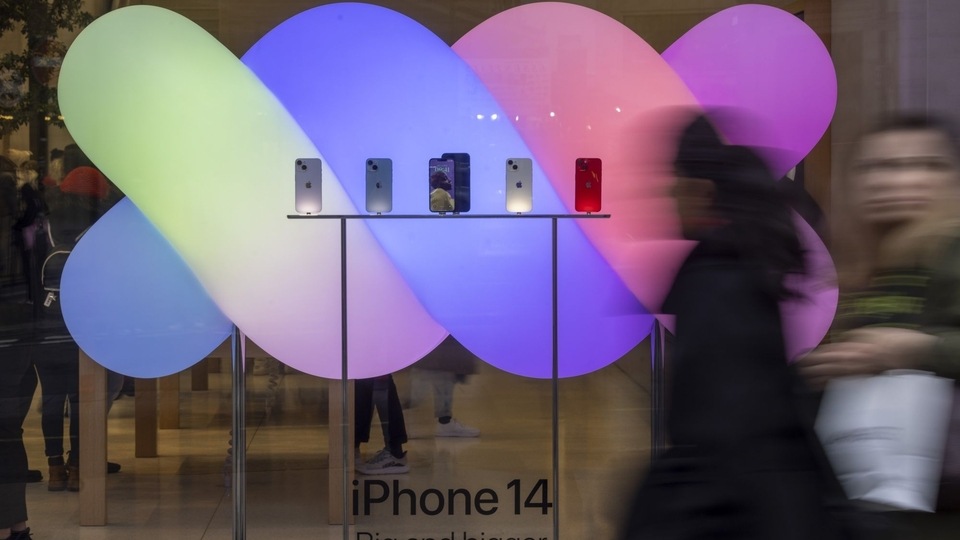Apple Blames Rotten Holiday Quarter on Supply Chain, Economy
Apple Inc. reported its worst holiday performance in four years after supply snags and a softening economy hurt iPhone sales.







 View all Images
View all ImagesApple Inc. reported its worst holiday performance in four years after supply snags and a softening economy hurt iPhone sales, exposing cracks in what has been one of tech's most resilient companies.
Revenue fell 5.5% to $117.2 billion in the December quarter, Apple's biggest sales period of the year, coming in well short of the average Wall Street estimate of $121.1 billion. It was Apple's first quarterly decline since 2019 and the first time the company has missed analysts' holiday sales projections since 2015.
Shares fell 3% during premarket trading in New York on Friday, the morning after Chief Executive Officer Tim Cook discussed a rebound in China, which is emerging from strict Covid-19 rules. He also said Apple's production problems have subsided.
The iPhone and Mac were particular weak spots for Apple last quarter, dragged down by a broader slump afflicting mobile devices and computers. The Covid restrictions in China added to Apple's woes, making it harder to ship enough of the most popular versions of the iPhone. Timing was another issue: The company didn't launch new Macs and HomePods until recent weeks, missing the end of the holiday quarter.
“The world continues to face unprecedented circumstances — from inflation to war in Eastern Europe to the enduring impacts of the pandemic — and we know that Apple is not immune to it,” Cook said on a conference call. “But whatever conditions we face, our approach is always the same. We are thoughtful and deliberate.”
Earnings came in at $1.88 per share during the fiscal first quarter, which ended Dec. 31. That compared with an average estimate of $1.94 per share.
The Cupertino, California-based technology giant didn't provide a detailed outlook for the second quarter, continuing an approach it adopted at the start of the pandemic in 2020, but it did lay out some expectations.
Apple said that its performance in the March quarter would mirror that of the first quarter. That means a revenue decline of about 5% — compared with $97.3 billion a year earlier — could be in the cards. On the positive side, the company said iPhone revenue would accelerate in the March quarter and that services revenue would grow. However, the iPad and Mac will likely decline.
Apple shares had closed up 3.7% at $150.82 in New York. They have gained 16% this year.
Apple generated $65.8 billion from the iPhone in the period, missing the estimate of $68.3 billion. That also represents a decline from the $71.6 billion that the product brought in a year earlier.
While the latest iPhone was a more significant leap than the previous version, the factories producing the popular Pro models in China were shuttered for weeks during the quarter due to pandemic restrictions.
The company made $7.74 billion from the Mac, far short of the $9.7 billion estimate. That's also a significant drop from $10.9 billion a year ago.
It was a tough year-over-year comparison given that Apple launched a revamped MacBook Pro line in the previous holiday period. This time around, it didn't update the MacBook Pro and Mac mini models until the current quarter.
The wearables, home and accessories division — a unit that includes the Apple Watch, HomePod speakers, Apple TV, AirPods and Beats products — brought in $13.5 billion. That fell short of Wall Street expectations of $15.3 billion. The division's sales also represented a decline from last year's $14.7 billion.
Other areas fared better. The iPad brought in $9.4 billion, beating the estimate of $7.8 billion. Apple launched minor iPad Pro updates and a revamped entry-level model in October. That led to growth from a weaker iPad quarter a year ago.
Services generated $20.8 billion, exceeding estimates of $20.5 billion and growing from $19.5 billion a year ago. A price hike helped. The cost of Apple Music climbed by $1 per month, with Apple TV+ going up by $2. The category also includes the App Store, AppleCare customer service and repairs, and offerings like Arcade and News+.
Chief Financial Officer Luca Maestri noted that the services revenue was a record total and that — holding currency constant — the company increased its overall sales.
And Cook said that Apple would continue to refine its supply chain.
“The last three years have been a pretty difficult time, between Covid and silicon shortages and the like,” he said. “I think we have had a very resilient supply chain.”
Catch all the Latest Tech News, Mobile News, Laptop News, Gaming news, Wearables News , How To News, also keep up with us on Whatsapp channel,Twitter, Facebook, Google News, and Instagram. For our latest videos, subscribe to our YouTube channel.


























